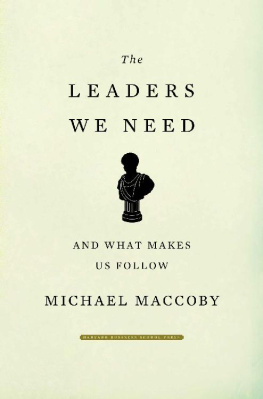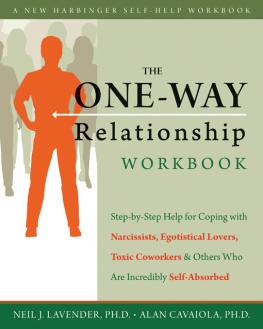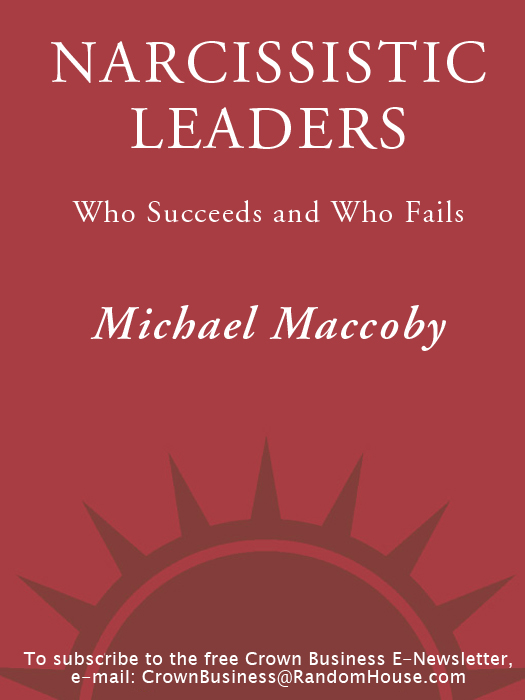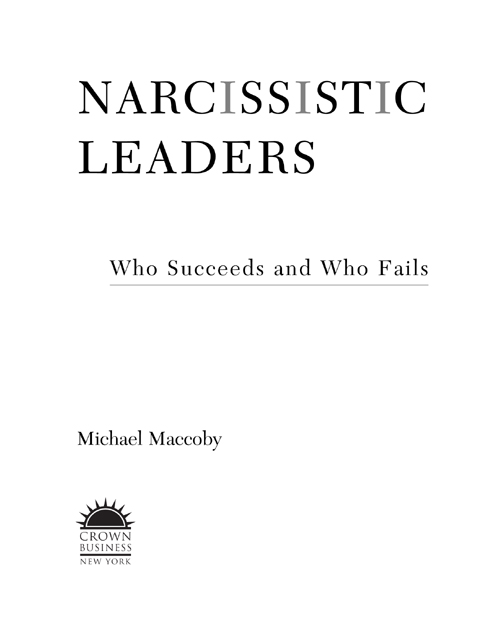ALSO BY MICHAEL MACCOBY
Social Character in a Mexican Village (WITH ERICH FROMM)
The Gamesman
The Leader
Why Work?
Sweden at the Edge
A Prophetic Analyst (WITH MAURICIO CORTINA)
Agents of Change (WITH CHARLES HECKSCHER, RAFAEL RAMIREZ, PIERRE-ERIC TIXIER)
Copyright 2003, 2007 by Michael Maccoby.
All rights reserved.
Published in the United States by Crown Business, an imprint of the Crown Publishing Group, a division of Random House, Inc., New York.
www.crownpublishing.com
CROWN BUSINESS is a trademark and CROWN and the Rising Sun colophon are registered trademarks of Random House, Inc.
Originally published as The Productive Narcissist in slightly different form in hardcover in the United States by Broadway Books, a division of Random House, Inc., New York., in 2003, and subsequently as Narcissistic Leaders in paperback in the United States by Harvard Business School Press, Boston, in 2007.
eISBN: 978-0-7679-1025-5
v3.1
And liberty cannot be preserved without a general knowledge among the people. But besides this they have a right, an indisputable, unalienable, indefeasible divine right to the most dreaded and envied kind of knowledge, I mean the character and conduct of their leaders.
JOHN ADAMS
A Dissertation on the Canon and Feudal Law, August 12, 1765
The third type (is) justly called the narcissistic type. There is no tension between ego and super-ego (indeed, on the strength of this type one would scarcely have arrived at the hypothesis of a superego), and there is no preponderance of erotic needs. The subjects main interest is directed to self-preservation; he is independent and not open to intimidation. His ego has a large amount of aggressiveness at its disposal, which also manifests itself in a readiness for activity. In his erotic life loving is preferred above being loved. People belonging to this type impress others as being personalities; they are especially suited to act as a support for others, to take on the role of leaders and to give a fresh stimulus to cultural development or to damage the established state of affairs.
SIGMUND FREUD
Libidinal Types, 1931
To Sandylee
ACKNOWLEDGMENTS
T his book grew out of an article in the January 2000 Harvard Business Review, Narcissistic Leaders: The Incredible Pros, the Inevitable Cons. Diane Coutu and David Champion encouraged me to write the article and guided it into publication. Shortly thereafter, I received a call from Charlie Conrad of Broadway Books, who was enthusiastic about my writing this book. As my editor, Charlie has been continually supportive and helpful with his suggestions.
Most of the research for this book has come from my experience as a consultant, business coach, and psychoanalyst combined with the interviews, books, and articles noted in the text. I have also benefited by conversations with Jim Moore, an author and consultant to high-tech leaders; Mark Liebovich, who interviewed a number of productive narcissists for his book The New Imperialists, and Karen Southwick, who is writing a book about Larry Ellison.
Richard Margolies, Ph.D., and Mauricio Cortina, M.D., were helpful in discussions about psychoanalytic theories of narcissism.
I appreciate support over twenty-five years from Mike Wolff, editor of Research Technology Management, which first published some of the ideas that have been developed in this book. Goran Collert and Sidney Harman helped by reading and commenting on drafts of . A number of executives provided material about their narcissistic bosses, but I would not be doing them a favor by thanking them publicly.
I owe special thanks to my assistant, Maria Stroffolino, who has helped in many ways, both preparing the manuscript and as a researcher.
Lydia Wills has been much more than a literary agent. She has challenged me to develop and clarify my ideas, to translate technical psychoanalytic thinking into common language, and she has shared in a two-year dialogue developing the themes of this book. I very much appreciate her contribution.
CONTENTS
PREFACE
I n a time of historic changes in the way we live and work, the opportunities before us, and the threats we face, visionary business leaders have spearheaded these changes with their ideas, revolutionary technology, and organizational innovations. But visionary leaders in both business and government have also been destructive pied pipers, ruining investors who believed in their shady businesses and leaving a legacy of hatred in people left behind in the wake of history. This book is about understanding both the good and the bad visionary leadersthe type of personality that Sigmund Freud, who identified himself as one, termed narcissistic.
As the business world changes, so do popular styles of leadership. When this book was first published in 2003, the stock of narcissistic business leaders had plummeted owing to the dot-com crash and Enron- and Tyco-type scams. Formerly admired narcissistic leaders were unmasked as failures, frauds, and fabricators. Even successful narcissists were frowned on as too greedy and self-promoting. While throughout the 1990s, bigger-than-life narcissists decorated the covers of Fortune, BusinessWeek, and even Time and Newsweek, in 2003 we saw a shattered marble bust of Jack Welch on the cover of The Economist.
For a while, the new twenty-first century ideal became the determined, methodical but self-effacing, quiet, reserved, even shy obsessive business leaders celebrated by Jim Collins in Good to Great. Even narcissistic bosses began to spout the self-deprecating talk we invariably hear on TV from the winners of golf tournaments. (Its a tough course, but I had a few lucky breaks, etc.) But of course theres a big difference between talking and acting humble. On May 20, 2006, at an Economist Leadership Forum on Narcissistic Leaders, in Rome, Fausto Bertinotti, president of the Chamber of Deputies, made the astute point that while only narcissists can be visionary leaders, theyd be wise to learn to act humble.
Then, in 2006, Fortune did an about-face. Steve Jobs, a prototypical productive narcissist, was named the model CEO for the twenty-first century. Why turn the spotlight from the modest but driven obsessives heralded a few years before? Was Fortune just reflecting the fact that Jobs had hit it big with the iPodor was there a dawning awareness that to sustain business success, you need bold innovators, productive narcissists? Of course, the problem with narcissists is that while somelike Jobs, Bill Gates, Larry Ellison, Howard Schultz, and Oprah Winfreykeep on innovating and producing what people want to buy, somelike Steve Case or Jean-Marie Messierflare out, and otherslike Bernie Ebbers, Kim Woo Chong, and Dennis Kozlowskiturn out to be crooked.
To understand differences among narcissists and even predict which visionaries will succeed and which are likely to fail, this book dissects narcissistic personalities and contrasts narcissists with the other psychoanalytic personalities: the careful obsessives, caring erotics, and adaptive marketing types. Ive changed the original title of this book from













